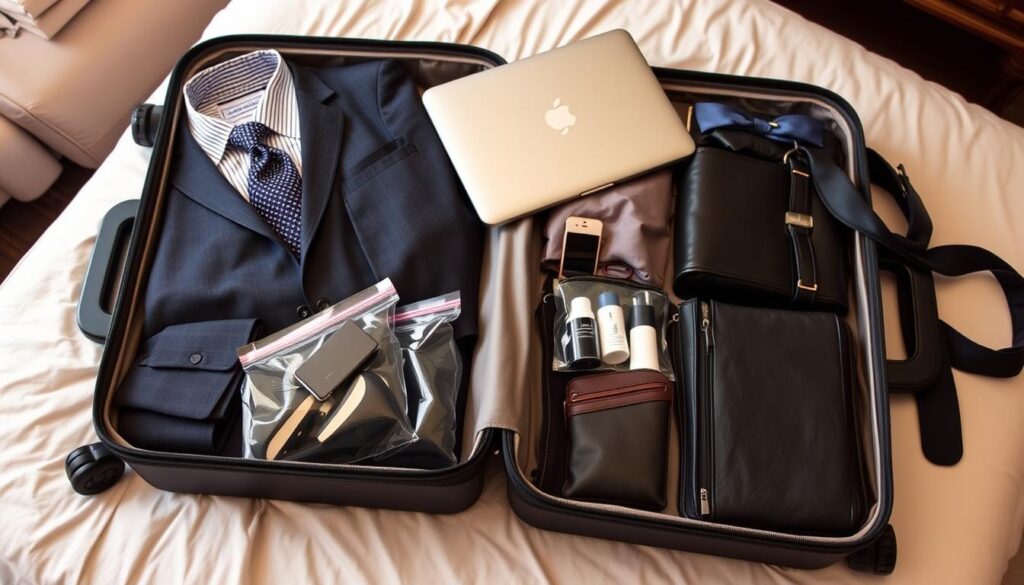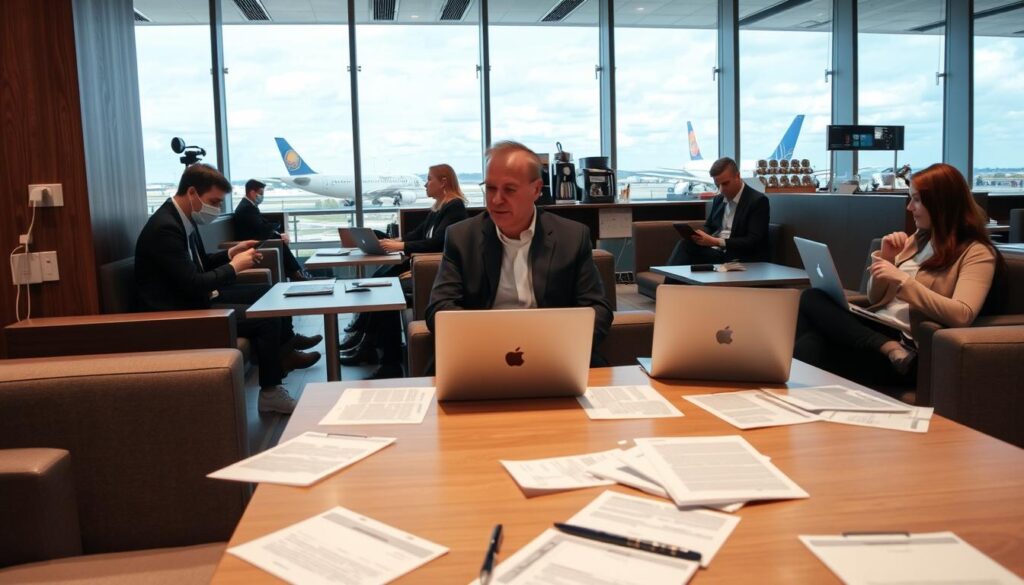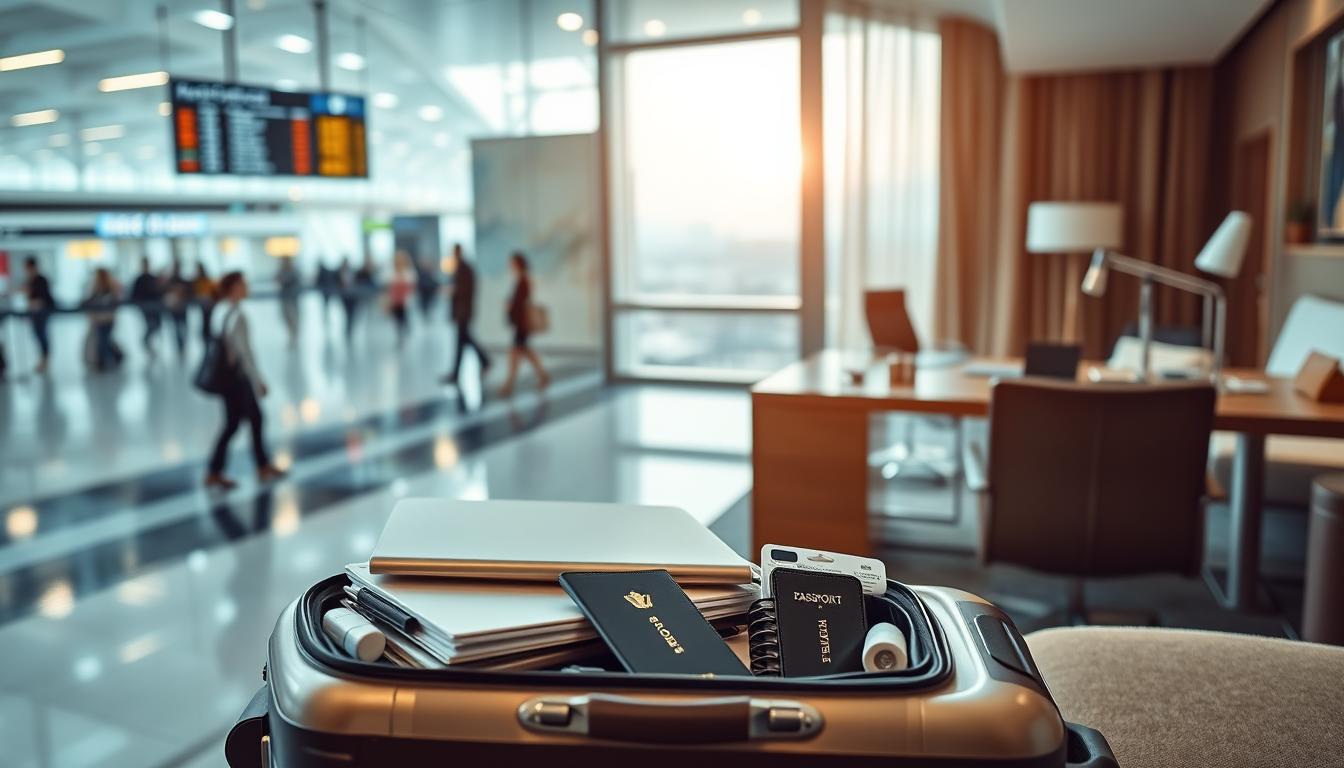Are you one of the 53% of US companies expecting to exceed three-quarters of your 2019 travel spend by the end of 2023? With corporate travel budgets reaching 98% of pre-pandemic levels, it’s clear that business trips are back in full swing. But how can you ensure that your travel management strategy is as efficient and effective as possible?
From planning your itinerary to staying productive on the go, there are countless ways to optimize your business travel experience. By implementing smart travel tips and leveraging the latest tools and technologies, you can minimize stress, maximize productivity, and achieve your corporate goals with ease.
In this comprehensive guide, we’ll explore a range of strategies for streamlining your business travel process, from booking flights and accommodations to managing expenses and staying connected with colleagues. Whether you’re a seasoned road warrior or a first-time traveler, these tips will help you navigate the challenges of corporate travel with confidence and ease.
Key Takeaways
- Plan your business trip in advance, taking into account your company’s travel policy, budget, and specific requirements
- Pack efficiently, prioritizing comfort and versatility while considering cultural differences and essential items
- Stay productive and connected during your trip by managing expenses, using travel rewards programs, and leveraging technology
- Make the most of your downtime by exploring the local area and maintaining your daily routines and self-care practices
- Invest in tools and services that streamline the travel process, such as airport lounge memberships, mobile check-in options, and comprehensive travel management apps
Planning Your Business Trip
When it comes to maximizing the efficiency and productivity of your business travel, thorough planning is essential. Research shows that corporate travel remains significant in the business world, emphasizing the importance of meticulous preparation for business trips. By dedicating time to careful planning, conducting detailed research, and following essential business travel tips, individuals can enhance the overall success and satisfaction of their business journeys.
Determine Your Travel Needs and Set a Budget
The first step in planning your business trip is to determine your specific travel needs and set a realistic budget. According to industry data, 65% of frequent business travelers find it crucial to plan their trips thoroughly to maximize efficiency and reduce stress. When establishing your travel budget, consider factors such as transportation, accommodations, meals, and incidentals. A study showed that 80% of business travelers set a budget in advance for their trips to control expenses and adhere to company policies.
Book Flights and Accommodations Early
To secure the best prices and preferred travel options, it is crucial to book your flights and accommodations as early as possible. Research indicates that 75% of business travelers book their flights and accommodations early to secure better prices and preferred seat selections. Utilize online travel booking sites to compare options and find the most suitable arrangements for your business trip. Statistics also highlight the importance of careful preparation for accommodations to ensure convenience and proximity to the meeting location during a business trip.
| Travel Planning Strategy | Percentage of Business Travelers |
|---|---|
| Set a budget in advance | 80% |
| Book flights and accommodations early | 75% |
| Use travel planning apps | 85% |
| Opt for travel planning services | 20% |
Plan Your Schedule and Use Travel Planning Services
To make the most of your business trip, plan your schedule carefully, taking into account meetings, events, and potential time differences between your home base and destination. Data reveals that 85% of business travelers use travel planning apps like TripIt to organize their schedules and consolidate travel details conveniently. Additionally, 20% of business travelers opt for travel planning services to assist with customized trip planning, saving time and ensuring efficient organization.
By leveraging technology and travel planning services, business travelers can streamline their itineraries, stay connected with colleagues, and make the most of their valuable time on the road.
Remember to be flexible and prepared to adjust your plans as needed, staying open-minded and solution-focused in the face of unexpected changes. Take advantage of technology like navigation apps, translation apps, and productivity tools to stay on top of tasks and deadlines while maximizing your business travel experience.
Packing Efficiently for Business Travel
When it comes to packing for a business trip, efficiency is key. By following some simple packing tips, you can ensure that you have all the essentials without overpacking. With lost baggage claims increasing by 30% last year, it’s more important than ever to pack smartly and avoid checked luggage when possible.

Create a Packing List and Use Packing Cubes
Start by creating a comprehensive packing list that includes all the items you’ll need for your business trip. Consider the length of your trip, the activities you have planned, and the weather conditions at your destination. Once you have your list, invest in some packing cubes to keep your luggage organized and maximize space. Packing cubes allow you to group similar items together and make it easy to find what you need quickly.
Pack Versatile Clothing Items and Consider Cultural Differences
When packing clothing for a business trip, focus on versatile items that can be mixed and matched to create multiple outfits. Brands like Everlane, Uniqlo, Vetta, and Universal Standard offer stylish and comfortable clothing options that are perfect for travel. It’s also important to consider cultural differences when packing. Research local business norms and pack accordingly to avoid any misunderstandings.
“Packing light is a skill that takes practice, but it’s well worth the effort. By focusing on versatile clothing items and packing efficiently, you can avoid the hassle of checked luggage and be prepared for anything your business trip throws your way.” – Sarah, frequent business traveler
Keep Essential Items Accessible and Bring Necessary Chargers
When packing your carry-on luggage, be sure to keep essential items like your laptop, travel documents, and any medications easily accessible. It’s also important to bring all necessary chargers and adapters for your electronic devices. Consider investing in a portable charging block to ensure that you always have power on the go.
| Travel Essential | Why It’s Important |
|---|---|
| Packing Cubes | Keeps luggage organized and maximizes space |
| Versatile Clothing | Allows for multiple outfit options with fewer items |
| Portable Charger | Ensures electronic devices always have power |
| Comfort Shoes | Allows for all-day wear during long travel days |
By following these packing tips and investing in the right travel accessories, you can streamline your business travel experience and arrive at your destination ready to tackle any challenges that come your way.
Staying Productive and Connected During Business Travel
Maintaining productivity and connectivity is essential for successful business travel. Research shows that effective time management is crucial for 84% of professional business travelers to stay productive during their trips. By implementing strategies to manage expenses, stay connected with colleagues, and make the most of downtime, business travelers can optimize their travel experience and achieve their goals.

Manage Expenses and Use Travel Rewards Programs
Effective expense management is a key aspect of business travel. According to industry statistics, 65% of business travelers experience difficulties in managing multiple responsibilities while on the road. To streamline the process, keep receipts, record expenses, and use apps or software to track and report them according to company policies. Additionally, leveraging travel rewards programs can help you earn points, miles, or other perks that can be redeemed for flights, hotels, or travel-related expenses, ultimately reducing your overall travel costs.
Stay Connected with Colleagues and Clients
Maintaining connectivity is crucial for business travelers to collaborate with colleagues and clients effectively. Studies indicate that investing in a portable Wi-Fi hotspot is beneficial for 70% of business travelers to ensure reliable internet access during their trips. Utilize communication apps, mobile hotspots, or local SIM cards to stay connected. Research data suggests that 85% of business travelers use cloud-based tools like Google Drive and Dropbox to access important files remotely, while 67% utilize video conferencing tools like Trello and Teams to communicate with their teams while on the go.
Make the Most of Your Downtime and Explore the Local Area
Business travel doesn’t have to be all work and no play. Making the most of your downtime can help you recharge and gain new perspectives. Data indicates that 78% of business travelers believe that maintaining a healthy work-life balance is important when traveling for work. Explore the local area, try new restaurants, attend cultural events, or pursue hobbies during your free time. Consider combining business and leisure by adding personal days to the beginning or end of a business trip for a cost-effective “bleisure” experience. Find workspaces that double as leisure spaces, like hotel rooms converted into WFH spaces with amenities and relaxing surroundings.
“Networking at industry events and conferences was suggested to make meaningful connections and explore collaborations. Encouragement was given to immerse oneself in local culture to establish rapport and avoid cultural missteps during business trips.” – Travel expert
Market studies indicate that 73% of business travelers maximize their productivity during travel time by catching up on work or preparing for meetings. Stay productive during transit by using travel time to read relevant materials and optimize your schedule. By embracing travel productivity, connectivity, and making the most of downtime, business travelers can ensure a successful and fulfilling experience on the road.
Conclusion
By implementing these business travel optimization strategies, professionals can maximize their time on the road, maintain productivity, and make the most of their experiences. Proper planning, efficient packing, expense management, and a focus on well-being and relationships are key factors in ensuring successful and enjoyable business trips. Travel efficiency can be achieved through the use of travel planning services, packing versatile clothing items, and staying connected with colleagues and clients.
Continuously reflecting on and learning from each business travel experience is crucial for identifying areas of improvement and enhancing future travel planning processes. By immersing themselves in local customs and business practices, professionals can gain valuable insights that contribute to their personal development and help them navigate the challenges of a globalized economy. Face-to-face meetings foster trust, rapport, and mutual understanding, which can significantly impact the outcome of deals and negotiations, ultimately leading to corporate travel success.
As millions of professionals worldwide engage in business travel each year, incorporating these practices into corporate travel routines can help individuals and companies gain a competitive advantage. By prioritizing in-person interactions and effective collaboration, businesses can drive innovation, adaptability, and resilience, contributing to both personal and organizational growth. Embracing these strategies can empower business travelers to navigate the complexities of corporate travel with ease and confidence, ensuring a successful and rewarding experience on every trip.
